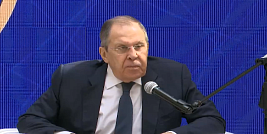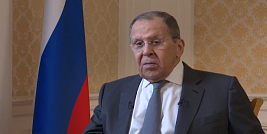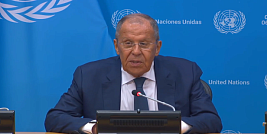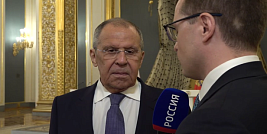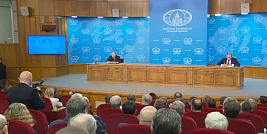Foreign Minister Sergey Lavrov remarks and answers to media questions during a joint news conference following talks with Yemen’s Deputy Prime Minister and Foreign Minister Abdulmalik Al-Mekhlafi, January 22, 2018
Ladies and gentlemen,
We have held productive talks, discussed in detail the political and military situation in Yemen, the prospects for a settlement of the domestic political crisis and also reviewed some issues of the bilateral agenda.
We consider it absolutely necessary to stop the armed standoff in Yemen, as well as the need for the conflict participants to abandon the use of force in resolving the accumulated problems. We believe it necessary to not only continue, but also boost the relevant international efforts with the central role of the UN to create conditions for establishing a sustainable intra-Yemeni dialogue with the participation of all political forces in the country.
We think that the scenarios for Yemen’s political development that were prepared in other formats and forced on the Yemeni people from the outside will most probably be unviable and even counterproductive.
Only the Yemeni people themselves can define the fate of their country. Russia, which maintains contacts will all Yemeni groups, is ready to facilitate this process. We see that this approach is accepted and supported by the leadership of the Republic of Yemen.
We paid much attention to the humanitarian situation in Yemen, which remains grave. According to the UN, 22 million Yemeni people – and this is a huge number – require help, and over 2 million children are on the verge of starvation.
In this context, Russia welcomes the decision of the Arab coalition to ease the blockade of the Yemeni port of Al Hudaydah, the only transport route that connects the country’s main city and northern provinces with the outside world.
We believe that the UN should henceforth be able to deliver humanitarian aid to Sanaa without fail. It is important to strive to lift the sea and air blockade, to remove all limitations on the deliveries of food, medicines and other prime necessities to all regions of Yemen with no exceptions.
Russia is making its contribution to support Yemeni people. Last year, the Emergencies Ministry planes delivered over 40 tonnes of humanitarian aid to Sanaa and Aden. The issue on preparing another batch of Russia’s humanitarian aid for the people in Yemen is being discussed.
Unfortunately, the long-standing conflict has resulted in the freezing of almost all main bilateral projects in trade, economic, cultural and other areas between the Russian Federation and the Republic of Yemen. We will be ready (and we see that our colleagues are interested in that, too) to resume and expand our relations in all areas when peace and stability are established in the country. Our peoples are interested in it since mutually beneficial relations between the two countries have a very long history: in November we will mark the 90th anniversary of our diplomatic relations.
Yemen’s Foreign Minister Abdulmalik Al-Mekhlafi and we have agreed to maintain close contacts both directly and via our embassy in Yemen, which due to security reasons has been recently relocated from Sanaa to Riyadh. At the same time, we will continue our dialogue with the Houthis and other Yemeni political associations, as well as with all interested states, including the Arab coalition, on which the further developments in the country and around it depend. We will urge everyone who can contribute to the settlement and the transition from war to a political dialogue to do so as soon as possible.
Question: How does Russia view the situation in Yemen after the assassination of former President Ali Abdullah Saleh?
Sergey Lavrov: First of all, when it happened, we saw it as a very grave crime. Obviously, it was conceived to torpedo efforts to move toward a peace settlement. As you know, President Saleh had called for establishing contacts with the government of President Abd Rabbuh Mansur Hadi, so as to stop this bloodshed. One had the impression that Ansar Allah would soon become completely isolated, and that the situation would be quickly rectified even without any political negotiations.
But as the situation unfolds, it is proving much more complicated. Mr Abdulmalik Abduljalil Al-Mekhlafi has just mentioned the situation at the General People's Congress whose delegates either advocated talks or an even tougher line of continuing the confrontation with the country’s legitimate leadership. All this merely confirms that there is no alternative to transitioning to inclusive intra-Yemeni negotiations. We share common positions with the leadership of the Republic of Yemen on this issue. We will promote this position during our subsequent contacts with the Yemeni parties and with all external players.
Question: The Turkish military operation against US-supported Kurds in northern Syria has been continuing for the last few days. What does Moscow think about this operation? Are you surprised at Washington’s extremely restrained response to these latest developments, and will they influence the place and role of the Kurds in the Syrian peace settlement?
Sergey Lavrov: First, you have no doubt read the statements from Moscow following the start of Turkey’s operation in Afrin. Statements have been made by the Foreign Ministry and the Defence Ministry. We called for restraint and for respecting the sovereignty and territorial integrity of the Syrian Arab Republic. As such, I would like to recall that we have been noting for a long time that the United States is moving to establish alternative institutions of state authority on a substantial part of Syrian territory. Washington openly and covertly delivers modern weapons to Syria and provides them to units cooperating with it, primarily the Syrian Democratic Forces, which relies on Kurdish militia.
Building on this policy of flagrant interference in the domestic affairs of the Syrian Arab Republic, they announced the establishment of some kind of border protection force along the entire border between Syria, Turkey and Iraq several days ago. Rather awkward denials were later voiced, although all this activity de facto continued the process of establishing control over Syrian territory on the border with Iraq and Turkey. At the same time, the USA has long been discouraging Kurds, with whom it is cooperating, from a dialogue with Damascus. Washington has been actively stoking separatist sentiments among the Kurds, while completely ignoring the sensitive nature and regional dimension of the Kurdish issue. While trying to understand the motives of this policy of Washington, one has no choice but to assume that it is based on a misunderstanding of the entire situation, or that it is a deliberate provocation.
As concerns the Kurds’ role in the further political process, it must be secured without a doubt, but at a common platform where all Syrian ethnic, religious and political forces are called for respecting Syria’s sovereignty and territorial integrity. On these grounds, the Kurds’ representatives were included in the list of Syrians invited to the Syrian National Dialogue Congress in Sochi next week.
Regarding the UNSC meeting initiated by France, I can say that we are somewhat concerned that it will be marked by more of the same prejudice regarding specific events in the Syrian conflict settlement process. Specifically, the Foreign Minister of France announced that the meeting will cover the situation both in Afrin, Eastern Ghouta and Idlib. For some time, our western partners have been trying to stir up a scandalous atmosphere around the situation in Eastern Ghouta and Idlib while ignoring the fact that a group of militants close to Jabhat al-Nusra remains in Eastern Ghouta and shells Damascus, including the Russian Embassy, and also ignoring the fact that only recently, thanks to the efforts of the Syrian government and the Russian military in Syria, medical evacuation began from Eastern Ghouta, including evacuation of children in need of urgent medical help.
While drawing the attention of the global community to Idlib’s humanitarian problems in the same emotional way, our western colleagues ignore the obvious fact that it was Eastern Idlib where Jabhat al-Nusra (a terrorist organisation prohibited by the UN) was ruling not so long ago. It was only recently that the Syrian army’s offensive began with our support and succeeded in surrounding the major part of the Jabhat al-Nusra group. Apparently, this fact is what’s causing so much concern to some Western countries, once again proving what we have been saying for several years: the United States and the US-led coalition are trying to spare Jabhat al-Nusra in every possible way and shield it from fire – evidently, to further their so-called Plan B for regime change. This is completely unacceptable to us and we will firmly oppose such attempts. It is indicative that while our Western partners raise the alarm about Eastern Ghouta and Idlib while clearly trying to shield Jabhat al-Nusra, they are not interested in taking a real look at the humanitarian toll of the operation in Raqqa that was literally levelled to the ground. We will keep insisting that the UN and the UNSC address this issue. The city requires massive humanitarian assistance and de-mining. Otherwise people will refuse to return there.
Question: Moscow has repeatedly stated that there is no alternative to dialogue between all the parties involved in the Yemen conflict. You repeated this view today several times. Has Moscow’s view met with understanding during contacts with regional partners, particularly, Riyadh?
Sergey Lavrov: As concerns the response to our view in favour of dialogue between all the Yemeni parties being the only way to resolve the crisis, I think my answer will be yes, this view is understood by all external actors, including the UN. We support the efforts of the Special Envoy for Yemen (currently Mr Ismail Ould Cheikh Ahmed) to establish a dialogue between the legitimate government, the General People's Congress party and the Houthis. These are the major forces and they are all objects of the UN’s attention. We welcome this and, as far as I understand, all the external actors involved in overcoming the crisis agree with this.
